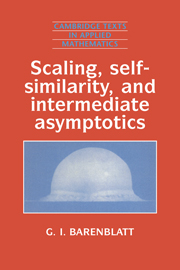 Scaling, Self-similarity, and Intermediate Asymptotics
Scaling, Self-similarity, and Intermediate Asymptotics Book contents
- Frontmatter
- Dedication
- Contents
- Preface
- Foreword
- Introduction
- 1 Dimensions, dimensional analysis and similarity
- 2 The construction of intermediate-asymptotic solutions using dimensional analysis. Self-similar solutions
- 3 Self-similarities of the second kind: first examples
- 4 Self-similarities of the second kind: further examples
- 5 Classification of similarity rules and self-similar solutions. A recipe for the application of similarity analysis
- 6 Scaling and transformation groups. Renormalization group
- 7 Self-similar solutions and travelling waves
- 8 Invariant solutions: asymptotic conservation laws, spectrum of eigenvalues, and stability
- 9 Scaling in the deformation and fracture of solids
- 10 Scaling in turbulence
- 11 Scaling in geophysical fluid dynamics
- 12 Scaling: miscellaneous special problems
- Afterword
- References
- Index
12 - Scaling: miscellaneous special problems
Published online by Cambridge University Press: 18 December 2014
- Frontmatter
- Dedication
- Contents
- Preface
- Foreword
- Introduction
- 1 Dimensions, dimensional analysis and similarity
- 2 The construction of intermediate-asymptotic solutions using dimensional analysis. Self-similar solutions
- 3 Self-similarities of the second kind: first examples
- 4 Self-similarities of the second kind: further examples
- 5 Classification of similarity rules and self-similar solutions. A recipe for the application of similarity analysis
- 6 Scaling and transformation groups. Renormalization group
- 7 Self-similar solutions and travelling waves
- 8 Invariant solutions: asymptotic conservation laws, spectrum of eigenvalues, and stability
- 9 Scaling in the deformation and fracture of solids
- 10 Scaling in turbulence
- 11 Scaling in geophysical fluid dynamics
- 12 Scaling: miscellaneous special problems
- Afterword
- References
- Index
Summary
Mandelbrot fractals and incomplete similarity
12.1.1 The concept of fractals. Fractal curves
In the scientific and even popular literature of recent time fractals have been widely discussed. By fractals are meant those geometric objects, curves, surfaces, volumes and higher-dimensional bodies having a rugged form and possessing certain special properties of homogeneity and self-similarity. Such geometric objects were studied intensively by mathematicians at the end of the last and the beginning of present century, in particular in connection with the construction of examples of continuous nowhere-differentiable functions. To most physicists and engineers they seemed mathematical monsters having no applications in the problems of natural science and technology. In fact, it is not so.
The revival of interest in such objects and the recognition of their fundamental role in natural science and engineering is due to a series of papers by B. Mandelbrot and especially to his remarkable monographs (1975, 1977, 1982). Mandelbrot coined the very term ‘fractal’ and introduced the general concept of fractality. In the monographs and subsequent papers Mandelbrot and his followers showed that, contrary to what was expected, this concept, enclosing many known special examples, appeared to be exceptionally fruitful in such diverse and important applications as polymer physics, geomorphology, the theory of Brownian motion, turbulence theory, astrophysics, fracture theory and many others. In the monographs of Mandelbrot are referenced from a unified viewpoint the preceding works of other authors that relate to these topics.
In this section we will demonstrate the concept of Mandelbrot fractals for the simplest example, fractal curves. We will discuss the properties of homogeneity and self-similarity that make a continuous curve fractal, and we will show that the very idea of fractals is closely related to the incomplete similarity concept. A non-trivial example related to the fractality of respiratory organs will be presented in conclusion.
- Type
- Chapter
- Information
- Scaling, Self-similarity, and Intermediate AsymptoticsDimensional Analysis and Intermediate Asymptotics, pp. 334 - 359Publisher: Cambridge University PressPrint publication year: 1996


